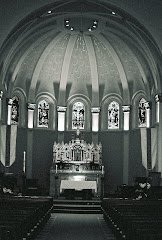11:00 Every Saturday Morning or by appointment:
All sin is an offense against God and a rejection of his perfect love and justice. Yet, Jesus makes a distinction between two types of sins. We call the most serious and grave sins, mortal sins. Mortal sins destroy the grace of God in the heart of the sinner. By their very grave nature, a mortal sin cuts our relationship off from God and turns man away from his creator. St. Paul’s letter to the Hebrews tell us that “if we sin willfully after having the knowledge of the truth, there is now left no sacrifice for sins” (Hebrews 10:26).
The second type of sin, venial sin, that of less grave matter, does not cut us off from Christ. However, venial sin does weaken grace in the soul and damages our relationship with God. A person who frequently indulges in venial sin is very likely to collapse into mortal sin if they persist in their evil ways.
In order for a sin to be mortal, it must meet three conditions:
•Mortal sin is a sin of grave matter
•Mortal sin is committed with full knowledge of the sinner
•Mortal sin is committed with deliberate consent of the sinner
This means that mortal sins cannot be done “accidentally.” A person who commits a mortal sin is one who knows that their sin is wrong, but still deliberately commits the sin anyway. This means that mortal sins are “premeditated” by the sinner and thus are truly a rejection of God’s law and love.
How to make one’s Confession
Bless me, Father, for I have sinned.
I confess to God Almighty and to you, Father.
It has been ___________ (days, weeks, months, years) since my last confession.
I have received absolution and performed (not performed) my penance.
Then you tell your sins. All mortal sins must be confessed in order to make a good confession. Venial sins may be confessed, and it is a very beneficial to do so on a spiritual level. When you have finished, add:
For these and all the sins that I can’t remember, and all the sins of my past life (you can specify one or another), I ask pardon of God and penance and absolution of you, Father.
The priest then may give you some words of advise and he gives you a penance. Then you say your act of contrition.
An act of Contrition
(Traditional Version)
O my God, I am heartily sorry for
having offended Thee,
and I detest all my sins,
because I dread the loss of heaven,
and the pains of hell;
but most of all because they offend Thee, my God,
Who are all good and deserving of all my love.
I firmly resolve, with the help of Thy grace,
to confess my sins, to do penance,
and to amend my life.
Amen.
(Contemporary Version)
My God, I am sorry for my sins with all my heart.
In choosing to do wrong and failing to do good,
I have sinned against you whom I should love above all things.
I firmly intend, with your help, to do penance, to sin no more,
and to avoid whatever leads me to sin.
Our Savior Jesus Christ suffered and died for us.
In His name, my God, have mercy.
Amen.
The priest gives the absolution. Your sins are forgiven, go in peace








